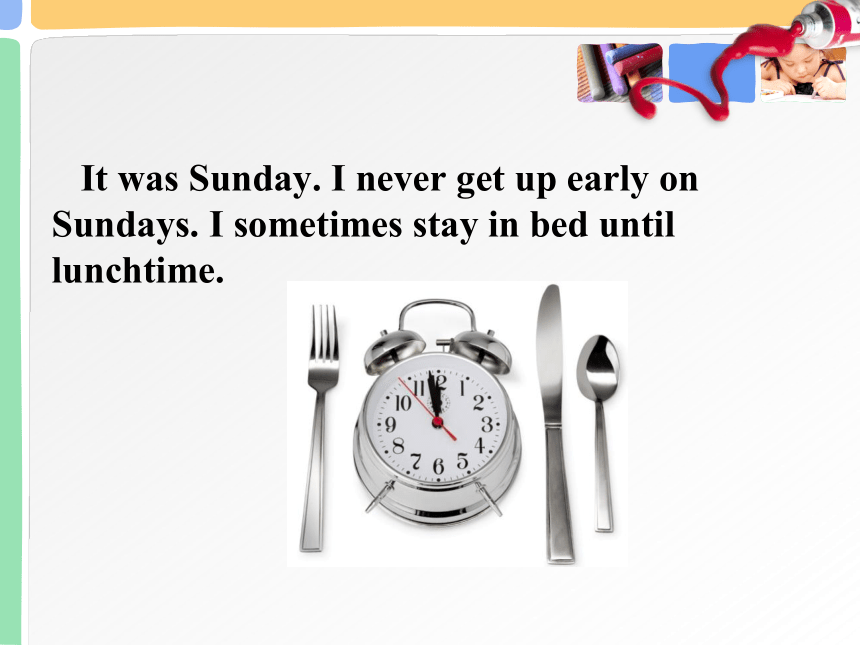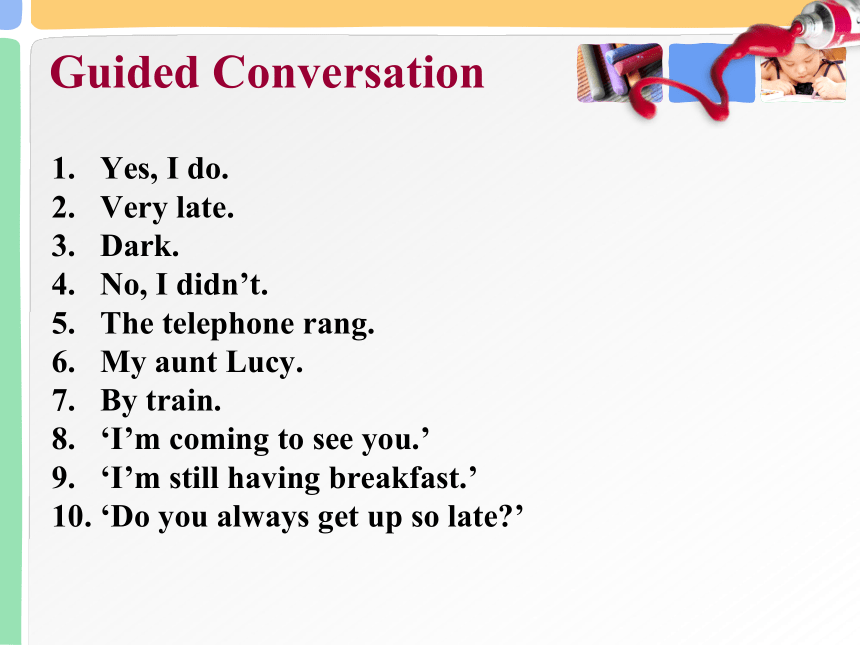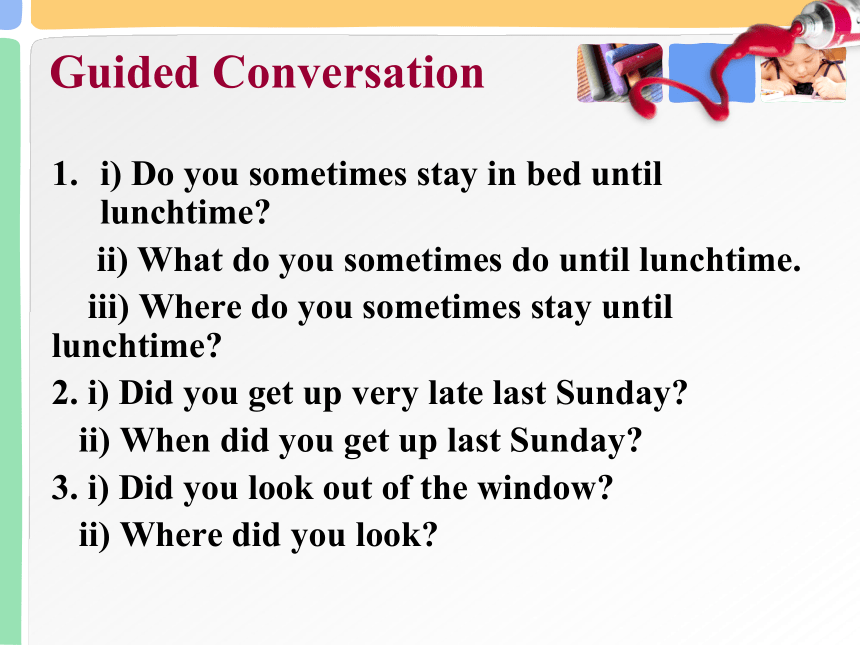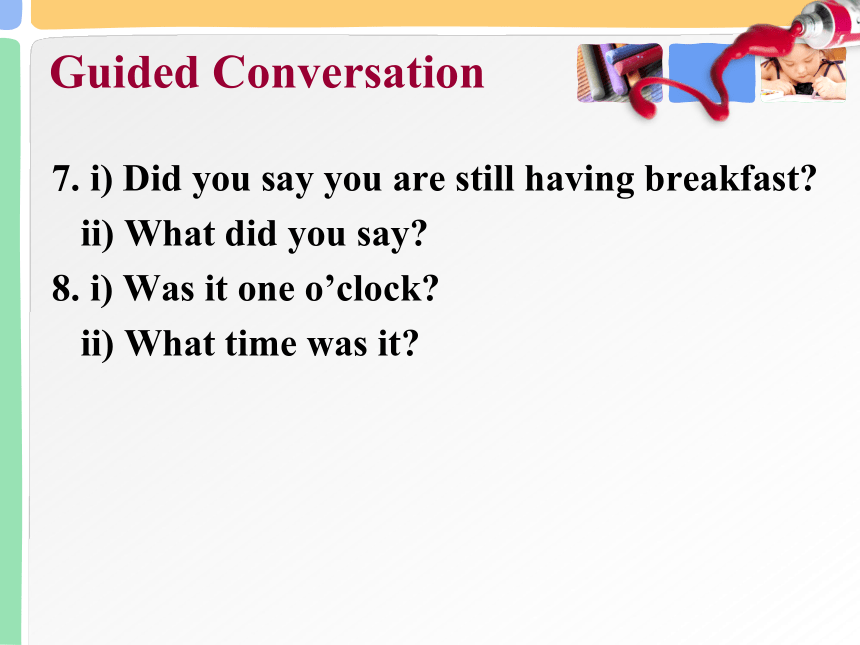新概念英语青少版4A:Unit 2 Breakfast or lunch?课件(28张PPT)
文档属性
| 名称 | 新概念英语青少版4A:Unit 2 Breakfast or lunch?课件(28张PPT) |  | |
| 格式 | zip | ||
| 文件大小 | 1.4MB | ||
| 资源类型 | 教案 | ||
| 版本资源 | 新概念英语 | ||
| 科目 | 英语 | ||
| 更新时间 | 2021-01-14 11:45:42 | ||
图片预览









文档简介
课件28张PPT。Unit 2 Breakfast or lunch? It was Sunday. I never get up early on Sundays. I sometimes stay in bed until lunchtime. Last Sunday I got up very late. I looked out of the window. It was dark outside. ‘What a day!’ I thought. ‘It’s raining again.’ Just then, the telephone rang. It was my Aunt Lucy. ‘I’ve arrived by train,’ she said. ’ I’m coming to see you.’
‘But I’m still having breakfast,’ I said. ‘What are you doing?’ she asked. ‘I’m having breakfast,’ I repeated. ‘Dear me!’ she said. ‘Do you always get up so late? It’s one o’clock!’Guided ConversationYes, I do.
Very late.
Dark.
No, I didn’t.
The telephone rang.
My aunt Lucy.
By train.
‘I’m coming to see you.’
‘I’m still having breakfast.’
‘Do you always get up so late?’Guided Conversation4. i) Did your aunt Lucy telephone just then?
ii) Who telephoned just then?
5. i) Had she come by train?
ii) How had she come?
6. i) Was she coming to you?
ii) Who was coming to see you?
iii) When was she coming to see you?Guided Conversationi) Do you sometimes stay in bed until lunchtime?
ii) What do you sometimes do until lunchtime.
iii) Where do you sometimes stay until lunchtime?
2. i) Did you get up very late last Sunday?
ii) When did you get up last Sunday?
3. i) Did you look out of the window?
ii) Where did you look?Guided Conversation7. i) Did you say you are still having breakfast?
ii) What did you say?
8. i) Was it one o’clock?
ii) What time was it?Guided ConversationTalk about you
Do you usually get up early or late at weekends?
Are you a ‘morning person’ or an ‘evening person’? Which is easier for you: getting up early, or getting up late? Why?
What do you usually have for breakfast? Do you have the same breakfast every day? What is your favorite breakfast?
Do you visit family members and friends at weekends? If you visit friends, do you just ring the doorbell, or do you usually phone them first?Pattern Practicering your friend 敲门(拜访朋友)
play football/ basketball 踢足球或打篮球
go to the library 去图书馆
write to Nina 给Nina写信
cook well 做菜不错
work hard 努力工作
stay in bed late 赖床很久
a strange story 一个奇怪的故事
wonderful actors 不错的演员
an entertaining play 一个娱乐性质的表演
horrible dresses 糟糕的着装
an amusing man 一个有趣的男人Pattern Practicering your friend 敲门(拜访朋友)Pattern Practiceplay football/ basketball 踢足球或打篮球Pattern Practicego to the library 去图书馆Pattern Practicewrite to Nina 给Nina写信Pattern Practicecook well 做菜不错Pattern Practicework hard 努力工作Pattern Practicestay in bed late 赖床很久Pattern Practicea strange story 一个奇怪的故事Pattern Practicewonderful actors 不错的演员们Pattern Practicean entertaining play 一个娱乐性质的表演Pattern Practicehorrible dresses 糟糕的着装Pattern Practicean amusing man 一个有趣的男人Key structures对比now 和 often& alwaysExercisesare playing… play… is kicking… is running
are you doing… am leaving… are you leaving… come… go… listen… feel
将频度副词代入
Key structures夸赞的用法:
我们不说
It’s a terrible day!
This is a beautiful picture!
我们说
What a terrible day!
What a beautiful picture!Grammar一般现在时与频度副词never, sometimes, usually, always, ever等连用
现在进行时表示现在正在发生的事情,例如:I’m still having breakfast.
介词by 可表示交通方式,例如: by train, by bicycle, by boat, by car, by plane
介词on可表示日期和星期的连用,如on Sundays
it做主语时可指代天气、日期和时间等,例如:It was raining/ Sunday.Byebye
‘But I’m still having breakfast,’ I said. ‘What are you doing?’ she asked. ‘I’m having breakfast,’ I repeated. ‘Dear me!’ she said. ‘Do you always get up so late? It’s one o’clock!’Guided ConversationYes, I do.
Very late.
Dark.
No, I didn’t.
The telephone rang.
My aunt Lucy.
By train.
‘I’m coming to see you.’
‘I’m still having breakfast.’
‘Do you always get up so late?’Guided Conversation4. i) Did your aunt Lucy telephone just then?
ii) Who telephoned just then?
5. i) Had she come by train?
ii) How had she come?
6. i) Was she coming to you?
ii) Who was coming to see you?
iii) When was she coming to see you?Guided Conversationi) Do you sometimes stay in bed until lunchtime?
ii) What do you sometimes do until lunchtime.
iii) Where do you sometimes stay until lunchtime?
2. i) Did you get up very late last Sunday?
ii) When did you get up last Sunday?
3. i) Did you look out of the window?
ii) Where did you look?Guided Conversation7. i) Did you say you are still having breakfast?
ii) What did you say?
8. i) Was it one o’clock?
ii) What time was it?Guided ConversationTalk about you
Do you usually get up early or late at weekends?
Are you a ‘morning person’ or an ‘evening person’? Which is easier for you: getting up early, or getting up late? Why?
What do you usually have for breakfast? Do you have the same breakfast every day? What is your favorite breakfast?
Do you visit family members and friends at weekends? If you visit friends, do you just ring the doorbell, or do you usually phone them first?Pattern Practicering your friend 敲门(拜访朋友)
play football/ basketball 踢足球或打篮球
go to the library 去图书馆
write to Nina 给Nina写信
cook well 做菜不错
work hard 努力工作
stay in bed late 赖床很久
a strange story 一个奇怪的故事
wonderful actors 不错的演员
an entertaining play 一个娱乐性质的表演
horrible dresses 糟糕的着装
an amusing man 一个有趣的男人Pattern Practicering your friend 敲门(拜访朋友)Pattern Practiceplay football/ basketball 踢足球或打篮球Pattern Practicego to the library 去图书馆Pattern Practicewrite to Nina 给Nina写信Pattern Practicecook well 做菜不错Pattern Practicework hard 努力工作Pattern Practicestay in bed late 赖床很久Pattern Practicea strange story 一个奇怪的故事Pattern Practicewonderful actors 不错的演员们Pattern Practicean entertaining play 一个娱乐性质的表演Pattern Practicehorrible dresses 糟糕的着装Pattern Practicean amusing man 一个有趣的男人Key structures对比now 和 often& alwaysExercisesare playing… play… is kicking… is running
are you doing… am leaving… are you leaving… come… go… listen… feel
将频度副词代入
Key structures夸赞的用法:
我们不说
It’s a terrible day!
This is a beautiful picture!
我们说
What a terrible day!
What a beautiful picture!Grammar一般现在时与频度副词never, sometimes, usually, always, ever等连用
现在进行时表示现在正在发生的事情,例如:I’m still having breakfast.
介词by 可表示交通方式,例如: by train, by bicycle, by boat, by car, by plane
介词on可表示日期和星期的连用,如on Sundays
it做主语时可指代天气、日期和时间等,例如:It was raining/ Sunday.Byebye
同课章节目录
- Unit 1 A private conversation
- Unit 2 Breakfast or lunch?
- Unit 3 Please send me a card
- Unit 4 An exciting trip
- Unit 5 No wrong numbers
- Unit 6 Percy Buttons
- Unit 7 Too late
- Unit 8 The best and the worst
- Unit 9 A cold welcome
- Unit 10 Not for jazz
- Unit 11 One good turn deserves another
- Unit 12 Goodbye and good luck
- Unit 13 The Greenwood Boys
- Unit 14 Do you speak English?
- Unit 15 Good news!
- Unit 16 A polite request
- Unit 17 Always young
- Unit 18 He often does this!
- Unit 19 Sold out
- Unit 20 One man in a boat
- Unit 21 Mad or not?
- Unit 22 A glass envelope
- Unit 23 A new house
- Unit 24 It could be worse
